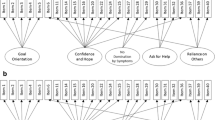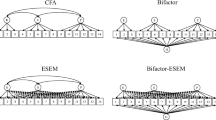Abstract
Study objectives were to 1) assess the reliability and validity of the 10-item Mental Health Recovery Measure (MHRM-10) in sample of predominately African American participants with serious mental illness, and 2) evaluate differences in MHRM-10 scores between the present sample and two other samples of persons with serious mental illness with different racial compositions. Participants included 230 adults (85.7% African American) with chart diagnoses of schizophrenia-spectrum, bipolar-spectrum, and major depressive disorders receiving services from community mental health centers in Detroit, Michigan. In addition to the MHRM-10, participants completed measures of psychological symptoms (Brief Symptom Inventory (BSI)- General Severity Index (GSI) and depression subscale), well-being (12-Item World Health Organization Disability Assessment Schedule 2.0; WHODAS 2.0), and stress-related growth (Stress-Related Growth Scale – Short Form; SRGS-SF). Internal consistency and convergent validity of the MHRM-10 were examined. Differences in MHRM-10 scores between the present sample and other samples were characterized by effect sizes. The MHRM-10 demonstrated excellent internal consistency. Evidence for convergent validity of the MHRM-10 included moderate correlations with the BSI-GSI, BSI-depression subscale, SRGS-SF, and WHODAS 2.0. The present sample of predominately African American participants showed higher MHRM-10 scores than two other samples with smaller proportions of African American participants. The MHRM-10 demonstrates excellent internal consistency and good convergent validity among African Americans with serious mental illness. Although findings are promising, studies should further assess the psychometric properties of the MHRM-10 in African American samples. Additional research that examines racial differences in mental health recovery is needed.
Similar content being viewed by others
References
Drake RE, Whitley R. Recovery and severe mental illness: Description and analysis. Can J Psychiatry. Revue Canadienne de Psychiatrie. 2014;59(5):236–42. https://doi.org/10.1177/070674371405900502.
Andresen R, Caputi P, Oades LG. Do clinical outcome measures assess consumer-defined recovery? Psychiatry Res. 2010;177(3):309–17.
Abraham K, Nelson C, Ganoczy D, Zivin K, Brandfon S, Walters H, Valenstein M. Psychometric analysis of the Mental Health Recovery Measure in a sample of veterans with depression. Psychol Serv. 2016;13(2):193–201.
Bullock WA. The mental health recovery measure. In Campbell-Orde T, Chamberlin J, Carpenter J, Leff HS editors. Measuring the Promise of Recovery: A Compendium of Recovery Measures (vol. II). Cambridge, MA: The Evaluation Center @ HSRI; 2005. p. 36–40. Retrieved from: https://www.hsri.org/publication/measuring-the-promise-a-compendium-of-recovery-measures-volume-ii.
Armstrong N, Cohen A, Hellemann G, Reist C, Young A. Validating a brief version of the Mental Health Recovery Measure for individuals with schizophrenia. Psychiatr Serv. 2014;65(9):1154–9.
Roysircar G. Culturally sensitive assessment, diagnosis, and guidelines. In: Constantine MG, Sue DW, editors. Strategies for building multicultural competence in mental health and educational settings. John Wiley & Sons Inc; 2005. p. 19–38.
Bullock WA. The Mental Health Recovery Measure (MHRM): Updated normative data and psychometric properties. 2009. Retrieved from: https://www.utoledo.edu/al/psychology/pdfs/MHRM_12-09.pdf.
Lim M, Xie H, Li Z, Tan BL, Lee J. Using the CHIME Personal Recovery Framework to evaluate the validity of the MHRM-10 in individuals with psychosis. Psychiatry Q. 2020;91(3):793–805. https://doi.org/10.1007/s11126-020-09737-2.
Ali MK, Hack SM, Brown CH, Medoff D, Fang L, Klingaman EA, Park SG, Dixon LB, Kreyenbuhl JA. Racial differences in mental health recovery among veterans with serious mental illness. J Racial Ethn Health Disparities. 2018;5(2):235–42. https://doi.org/10.1007/s40615-017-0363-z.
Nasreddine ZS, Phillips NA, Deirian V, Charbonneoau S, Whitehead V, Collin I, Cummings JL, Chertkow H. The Montreal Cognitive Assessment, MoCA: a brief screening tool for mild cognitive impairment. J Am Geriatr Soc. 2005;53(4):695–9.
Hickman NJ, Prochaska JJ, Dunn LB. Screening for understanding of research in the inpatient psychiatry setting. J Empir Res Hum Res Ethics. 2011;6(3):65–72.
Abraham KM, Ganoczy D, Yosef M, Resnick SG, Zivin K. Receipt of employment services among VA users with psychiatric diagnoses. J Rehabil Res Dev. 2014;51:401–14.
Derogatis LR, Melisaratos N. The brief symptom inventory: an introductory report. Psychol Med. 1983;13(3):595–605.
Derogatis LR. Brief Symptom Inventory (BSI) – 18. Administration, Scoring and Procedures Manual. Minneapolis: NCS Pearson, Inc.; 2001.
Hoe M, Brekke JS. Cross-ethnic measurement invariance of the Brief Symptom Inventory for individuals with severe and persistent mental illness. Soc Work Res. 2008;32(2):71–8. Retrieved from: https://libraries.udmercy.edu/docview/212142968?accountid=28018.
Andrews G, Kemp A, Sunderland M, Von Korff M, Ustun TB. Normative data for the 12 item WHO Disability Assessment Schedule 2.0. PLoS One. 2009;4(12):e8343.122.
Bastiaens L, Galus J, Goodlin M The 12 Item W.H.O.D.A.S. as primary self-report outcome measure in a correctional community treatment center for dually diagnosed patients. Psychiatric Q. 2014;86(2):219.
Cohen LH, Hettler TR, Pane N. Assessment of post-traumatic growth. In: Tedeschi RG, Park CL, Calhoun L, editors. Posttraumatic growth: positive changes in the aftermath of crisis. Mahwah, NJ: Lawrence Erlbaum Associates; 1998. p. 23–4.
Park C, Cohen L, Murch R. Assessment and prediction of stress-related growth. J Pers. 1996;64(1):71–106.
Caserta M, Lund D, Utz R, de Vries B. Stress-related growth among the recently bereaved. Aging Ment Health. 2009;13(3):463–76. https://doi.org/10.1080/13607860802534641.
Hettler TR, Cohen LH. In Tedeschi RG, Park CL, Calhoun L, editors. Posttraumatic growth: Positive changes in the aftermath of crisis. Mahwah, NJ: Lawrence Erlbaum Associates. 1998, p. 34.
Cohen J. Statistical power analysis for the behavioral sciences. 2nd ed. Hillsdale, NJ: Erlbaum; 1988.
Becker LA. Effect size calculators. University of Colorado, Colorado Springs. 2000. Retrieved from: https://lbecker.uccs.edu/#Calculate%20d%20and%20r%20using%20t%20values%20(separate%20groups).
Heale R, Twycross A. Validity and reliability in quantitative research. Evid Based Nurs. 2015;18(3):66–7.
Kessler RC, Chiu WT, Demler O, Merikangas KR, Walters EE. Prevalence, severity, and comorbidity of 12-month DSM-IV disorders in the National Comorbidity Survey Replication. Arch Gen Psychiatry. 2005;62(6):617–27. https://doi.org/10.1001/archpsyc.62.6.617.
Acknowledgements
The authors are grateful for the support of staff and leadership at Central City Integrated Health, Development Centers, Inc., and New Center. The authors appreciate the contributions of Kate Dykhuis and Monika Sata to study management and the assistance of various graduate and undergraduate student research assistants.
Funding
This research was supported by the National Institute on Minority Health and Health Disparities of the National Institutes of Health under Award Number R15MD010214. The content is solely the responsibility of the authors and does not necessarily represent the official views of the National Institutes of Health.
Author information
Authors and Affiliations
Corresponding author
Ethics declarations
The authors have no relevant financial or non-financial interests to disclose. All authors certify that they have no affiliations with or involvement in any organization or entity with any financial interest or non-financial interest in the subject matter or materials discussed in this manuscript. The authors have no financial or proprietary interests in any material discussed in this article.
Ethics Approval
The study was approved by the Institutional Review Board at the University of Detroit Mercy. All human participants were screened for the capacity to give consent and subsequently provided written informed consent prior to participating in the study.
Conflict of Interest
The authors have no known conflict of interest to disclose.
Additional information
Publisher's Note
Springer Nature remains neutral with regard to jurisdictional claims in published maps and institutional affiliations.
Rights and permissions
About this article
Cite this article
Weber, R.L., Abraham, K.M. An Assessment of the 10-Item Mental Health Recovery Measure in a Predominantly African American Sample of Adults with Serious Mental Illness. Psychiatr Q 93, 849–860 (2022). https://doi.org/10.1007/s11126-022-09995-2
Accepted:
Published:
Issue Date:
DOI: https://doi.org/10.1007/s11126-022-09995-2




